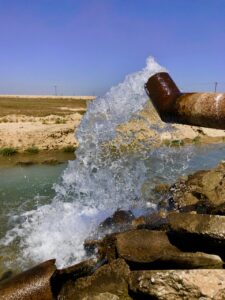On Friday, September 6, 2024, the House Natural Resources Subcommittee on Water, Wildlife & Fisheries held a hearing in Santa Nella, CA on the subject of Water Abundance: Opportunities and Challenges in California.
The hearing was led by Congressman John Duarte (CA13), and featured Congressmen Cliff Bentz (OR2), David Valadao (CA22), Vince Fong (CA20), Doug LaMalfa (CA1), and Tom McClintock (CA5).
Witness testimony was provided by Allison Febbo, General Manager, Westlands Water District – Jason Phillips, CEO, Friant Water Authority – William Bourdeau, CEO, Bourdeau Farms – John Herrick, Counsel & Manager, South Delta Water Agency – Josh Weimer, Director of External Affairs, Turlock Irrigation District – Ronda Lucas, Attorney, Lucas Law.
The two-hour hearing focused attention on the disastrous consequences of water mismanagement following California’s most recent drought – but also pointed the way toward common sense solutions.
Despite record rainfall last winter, water allocations to Central Valley farmers and cities were astonishingly stingy: initially just 5%, finally – belatedly – raised to 50%. This is because water policy decision making is both cumbersome and opaque. Increasing regulations have reduced flexibility of water operators to adapt to changing conditions. And recent biological opinions regarding fish species have further restricted water available for human use.
By far the most distressing aspect of the hearing was the three empty chairs – space allocated for the federal government agencies most responsible for water policy in California: the Bureau of Reclamation, the US Fish & Wildlife Service, and the National Oceanic and Atmospheric Administration. The agencies were invited to participate. None bothered to even show up.
This imperious lack of response illustrated a major complaint expressed by the Congressmen, and the witnesses: water policy decisions are made in California by unelected bureaucrats who reject scientific evidence that does not support their predetermined policy decisions, without consequence and without properly exercised Congressional oversight.
Water is being taken away from people in order to protect fish. But despite these efforts over decades, no fish have been saved. Not one California endangered species has recovered, and some have gone completely extinct. Meanwhile, Central Valley farming is being destroyed. Thousands of jobs are being lost, towns are dying, hundreds of thousands of acres of the world’s most productive farmland are turning into a dust bowl.
This is not the result of climate change or a wrathful Mother Nature. It is the result of deliberate choices by California’s water decision makers.
Good science exists. There are ways to better protect endangered species while at the same time providing abundant water for human needs. The problem is that the science is being ignored by the governing agencies – despite existing laws demanding that it be followed.
California needs to expand its water storage capacity by obvious projects like raising Shasta Dam and building the Sites Reservoir. But it also must reform the regulatory and permitting processes so that the law is followed not just by farmers and water districts – but by the government as well.
Using common sense will properly allocate California’s water supply, enabling Central Valley farmers to continue feeding the world, while better protecting endangered species.
Highlights:
Jason Phillips, Friant Water Authority: “Regulatory decisions and legislative inaction in California are forcing us towards water scarcity.”
Allison Febbo, Westlands Water District: “The growers in our district are facing a crisis… the continual erosion of our water supply from the Bureau of Reclamation.”
Ronda Lucas, Lucas Law: “The water flowed not into the communities to sustain life, but out to the ocean on the off chance it might, somehow, increase fish populations. More than crops died. People died. Dreams died. Communities died. Hope died. And the fish did not improve demonstrably.”
William Bourdeau, Bordeau Farms: “We must move away from a narrative of scarcity towards a vision of abundance… This is not just about securing water for crops; it’s about securing a future where families can thrive, communities can grow, and the American Dream remains within reach for all.”
John Herrick, South Delta Water Agency: “There’s going to be a catastrophe, and the system won’t work anymore.”
Cong. McClintock: “We’re not gonna solve our water shortages until we build more reservoirs, and we won’t build more reservoirs until we fundamentally change these laws.”
Cong. Valadao: “There’s no evidence that species have recovered, with all the economic damage that has been done?” Phillips: “None. Over a million acres of farmland will have to be retired when we lose our groundwater.”
Lucas: “We know how to save these fish and keep water abundant; they’re just ignoring it.”
McClintock: “We’ve squandered hundreds of billions of dollars making the environmental situation worse, without doing a damn thing to maintain the fish populations… They pay no attention to the public; they pay no attention to the science. They’re following a weird kind of religion that has no foundation in science… This is a nature versus Newsom debate, and the fault is not with nature… This is a choice that we made when we elected these imbeciles.”
Lucas: “These people are choosing to cut off your water. Are you OK with that?”
Lucas: “The Endangered Species Act is approaching its 51st birthday. And in those 51 years, we have listed 1700 species. We have recovered less than 2%.”
Bourdeau: “I don’t think they understand the impact to the people they are regulating. I wish they would show up at places like this and see what devastation their bad decisions are making.”
But the federal agencies responsible for this economic and environmental disaster didn’t show up.
Will you?
